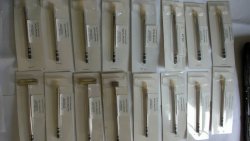eidairaman1
The Exiled Airman
- Joined
- Jul 2, 2007
- Messages
- 44,466 (6.74/day)
- Location
- Republic of Texas (True Patriot)
| System Name | PCGOD |
|---|---|
| Processor | AMD FX 8350@ 5.0GHz |
| Motherboard | Asus TUF 990FX Sabertooth R2 2901 Bios |
| Cooling | Scythe Ashura, 2×BitFenix 230mm Spectre Pro LED (Blue,Green), 2x BitFenix 140mm Spectre Pro LED |
| Memory | 16 GB Gskill Ripjaws X 2133 (2400 OC, 10-10-12-20-20, 1T, 1.65V) |
| Video Card(s) | AMD Radeon 290 Sapphire Vapor-X |
| Storage | Samsung 840 Pro 256GB, WD Velociraptor 1TB |
| Display(s) | NEC Multisync LCD 1700V (Display Port Adapter) |
| Case | AeroCool Xpredator Evil Blue Edition |
| Audio Device(s) | Creative Labs Sound Blaster ZxR |
| Power Supply | Seasonic 1250 XM2 Series (XP3) |
| Mouse | Roccat Kone XTD |
| Keyboard | Roccat Ryos MK Pro |
| Software | Windows 7 Pro 64 |
@Ferrum Master, the video portion showing Solder paste was sweet, never knew it existed myself.
As I said it's beneficial for GPUs
Did you watch the entire video? He covers that.
I agree, TPU community, either add Soldering tips or, just step away from the keyboard.
Scholarship really?
As I said it's beneficial for GPUs
It is not a good video. It is not done like that anymore... like student level. You need a preheater under and sum up the energy in order not to damage the part an PCB, often you will not be able to heat up the part off the multi layer PCB due to thick copper layer, you will burn the upper PCB black but the solder will not melt. Especially like for ones that knocked a cap off the PCB.
SMD parts are put on using air gun and prehater... that's the most harmless way for the part and PCB. Soldering gun more for robust through hole devices. They have longer legs and don't heat up the semiconductor core damaging it.
With method like soldering all the pins together in many cases PCB traces will pop off and permanently damage the board. Plain isopropanol cannot be used for cleaning semiconductors as it was held in aluminum barrels thus it has metal ions, as a result the MCU will soak it and start to hang up often. Those things are bitten through like 20 years ago.
Also guys and galls... doing much SMD soldering without a microscope or at least some magnifying glass will instantly put you on prescription glasses queue.
Did you watch the entire video? He covers that.
I have to agree 100%.
People, this is a help thread and the negativity is needless. If us users want to offer alternate methodologies for soldering, thats one thing.
I agree, TPU community, either add Soldering tips or, just step away from the keyboard.
I don't comment youtube at all.. I don't consume low quality material. If I see endorsement for such things here it just amuses me and make me sad.
Such things as soldering need proper scholarship, not a youtube video. You must attend some sort of real courses with a teacher and equipment and play on with things, there are electronics circles everywhere around the world, use them. Not doing the stuff from first time and damage it even more as it usually ends up. It ain't that simple. It ain't fixing a broken power cord. We are talking about high tech SMD part soldering... not some plain simple through hole one layer PCB. Things have changed in the last 10 years very fast due to rapid tech development. Home repairs are not a reasonable thing to recommend to someone.
Scholarship really?











